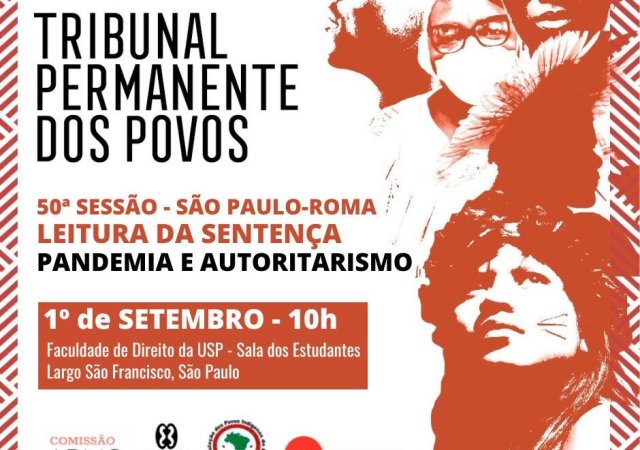Following the conclusion of the 50th session on Pandemic and Authoritarianism, held at the University of São Paulo’s law faculty, the Permanent Peoples’ Tribunal (PPT) issued a judgment recognizing President Jair Messias Bolsonaro liable for crimes against humanity, and for resulting in the deaths of thousands of people as a consequence of Covid-19 prevention policies. Specifically, the PPT found that the rejection of the Covid-19 pandemic policy of isolation, distancing, prevention, and vaccination led thousands of people to their deaths, especially those belonging to the most vulnerable groups in Brazilian society, namely indigenous peoples, black people, and quilombolas communities. The Tribunal argued that “contrary to the unanimous position of scientists around the world and WHO recommendations, Bolsonaro not only ensured that the Brazilian population did not adopt the planned measures to limit the infection but repeatedly created various obstacles to them, frustrating his own government’s attempts to establish policies to protect the population from the virus.” (Judgment, p. 16). The Tribunal further noted that these crimes took place in the more general context of a specific and severely discriminatory policy directed against indigenous peoples, blacks, and quilombolas such to constitute direct criminal liability for gross violation of human rights. In the specific case of indigenous peoples, the Tribunal considered that the situation of repression of their right to life coincides with a process of progressive genocide, drop by drop, such that it necessitated an urgent and direct response by the International Criminal Court as the legal body directly competent.
Thus, a ruling that unequivocally qualifies President Jair Messias Bolsonaro’s individual responsibility for the crimes found to have taken place has a more general relevance within the framework of international law. As explicitly emphasized in the concluding section, “this judgment takes on significance as a condemnation of the criminal nature of all human rights violations committed by those in power, resulting in criminal liability: not only for the murderous policies that enabled the mass contagion from Covid-19 but in general for all policies that violate human rights. Indeed, the arguments of this ruling can also be applied to other massive human rights violations, such as failure to provide assistance, kidnapping, port closures, and naval blockades, implemented against migrants by many governments, or proposed by candidates for government positions. This shows the gravity of these behaviors by calling them by their name: crimes against humanity whose criminal responsibility weighs even above the rulers. Finally, this ruling represents a step in the fight against human rights violations” (Judgment, p. 17).
—-
The Indictment
In the indictment submitted to the PPT, the requesting organizations- Commission for the Defense of Human Rights Dom Paulo Evaristo Arns, the Articulation of Indigenous Peoples of Brazil (Apib), the Black Coalition for Rights, and Public Services International (PSI) – argued that President Bolsonaro and his government intentionally spread Covid-19 pandemic by generating preventable deaths that mainly affected the indigenous population, people of color, and health workers, as part of his broader policy of human rights violations, erosion of democracy, and discrimination against minorities. Committing, therefore, the crime of intentional spread of a pandemic, which the authors of the indictment identified as a crime against humanity as part of a larger genocidal policy against indigenous peoples.
Jury composition.
ANTIGUA AND BARBUDA – Sir Clare Roberts, former minister of justice, former president of the Inter-American Commission on Human Rights, and former judge of the Eastern Caribbean Supreme Court; ARGENTINA – Alejandro Macchia, physician, and epidemiologist; Eugenio Raúl Zaffaroni, former member of the Argentine Supreme Court and former judge of the Inter-American Court of Human Rights – OAS; BRAZIL – Kenarik Boujikian, former appellate judge of the São Paulo Court of Justice; Rubens Ricupero, ambassador, former minister, former secretary general of the United Nations Conference on Trade and Development; Vercilene Dias Kalunga, Quilombola leader and lawyer; UNITED KINGDOM – Baroness Vivien Stern, member of the House of Lords, specialist in criminal law and human rights; ITALY – Nicoletta Dentico, journalist, writer, and global health consultant; PORTUGAL – Luís Moita, professor at the Autonomous University of Lisbon, specialist in peace and war studies.




